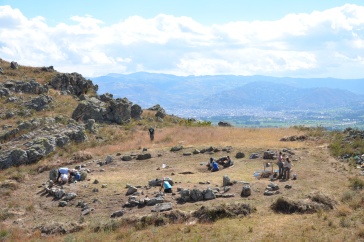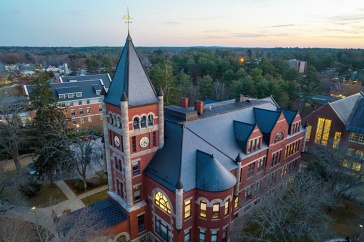THE BONE BRIDGE
TRINA DAVIES
WORLD PREMIER OF A FRIGHTENINGLY TIMELY PLAY
BOSNIA, 1990'S:
A charismatic leader excites his followers with myths and fantasies of their past greatness, and promises that they will be great again when they take their country back. They must rid themselves of the Muslims who, he avers with no evidence, are establishing an Islamic republic, and who just don't belong in the land. This rhetoric leads to the worst genocide since the Nazi-perpetrated slaughter.
Trina Davies' play, by turns searing and morbidly funny, tells how a handful of Bosnians, victims and perpetrators alike, try to mend their lives in the aftermath of the genocide and associated attrocities. What happens when two Bosnians, taking refuge years later in Canada, spot a concentration camp guard and torturer in the line at Home Depot? What happens when a Muslim judge, having spent terrible years in a concentration camp, makes her weary way home to discover that one of her former secretaries is now living in her apartment? How would you like to have tea served to you on your own grandmother’s tea set by an intruder who has, in your forced absence, moved into your home? The play invites us to ponder whether it is possible to mend broken cups, broken bridges, broken lives.
Director’s Note
The Department of Theatre and Dance at the University of New Hampshire is honored to be offering the world premiere of Trina Davies' play The Bone Bridge, which takes as its subject the heart-wrenching aftermath of the genocide and associated crimes committed by Serbs against Bosnian Muslims during the 1990's. We present this play, winner of the Woodward International Playwriting Prize, through the auspices of Cultural Stages: a program one of whose purposes is to give "UNH theatre and dance students the opportunity to gain a deep understanding of other cultures and societies by seeing the world through the eyes of the characters they portray." Moreover, Cultural Stages offers the entire UNH community the chance to increase their awareness and deepen their understanding of cultures and societies with which they may not previously have been familiar.
I experienced firsthand the absolute necessity of the Cultural Stages program when I taught The Bone Bridge in two of my courses last spring. With perhaps one or two exceptions, my students were ignorant of the crimes committed against Bosnian Muslims, and without exception, my students were appalled to learn that such crimes had been committed so recently. My students are emphatically not at fault. Their not knowing this sorry history stems, I think, from the fact that so many Americans at the time turned away from the war and genocide in Bosnia, and the related fact that most Americans kept our eyes and minds averted during the intervening years. Maybe we are fatigued and numbed by the many criminal acts of hatred that have befouled what Bertolt Brecht has called the great and ghastly twentieth century, and that are befouling the perhaps even ghastlier century that is following it. Maybe we Americans are ashamed because Americans and their European allies responded so badly to the war crimes in Bosnia while they were being committed.
Yet it has never been more necessary for us in the United States and here in New Hampshire to become aware of these events as only theatre, in its fierce urgency, can make us aware. You will hear speeches by the Leader and his followers that will sound painfully familiar to you, because you have heard so many similar sentiments, expressed in similar language, during the recent political campaign and its aftermath. As I write this, we are learning of crimes against Muslims in Myanmar that eerily repeat the crimes against Muslims that we experience in this play.
The United States is not taking the road to genocide that was taken by those in Bosnia and now in Myanmar, but there are warning signs in Charlottesville, as well as in Claremont, New Hampshire, and rhight here in Durham. With each passing day, this play seems more timely--painfully more timely than it seemed when I first read it in the summer of 2016 as a member of the Woodward Prize Committee.
Though the play deals with war crimes and their consequences, these crimes are not its primary subject. The play takes up the even more difficult subjects of reconciliation, healing, the difficult business of getting on with the fragments of damaged lives, the heroic attempts to fashion those fragments into a new whole. To invoke the words of T.S. Eliot, a great poet whose response to the genocide of his time was also equivocal: "After such knowledge, what forgiveness?"
-
Written By:
Sarah Harvey | College of Liberal Arts, Department of Education | sarah.harvey@unh.edu | (603) 862-5263
















































